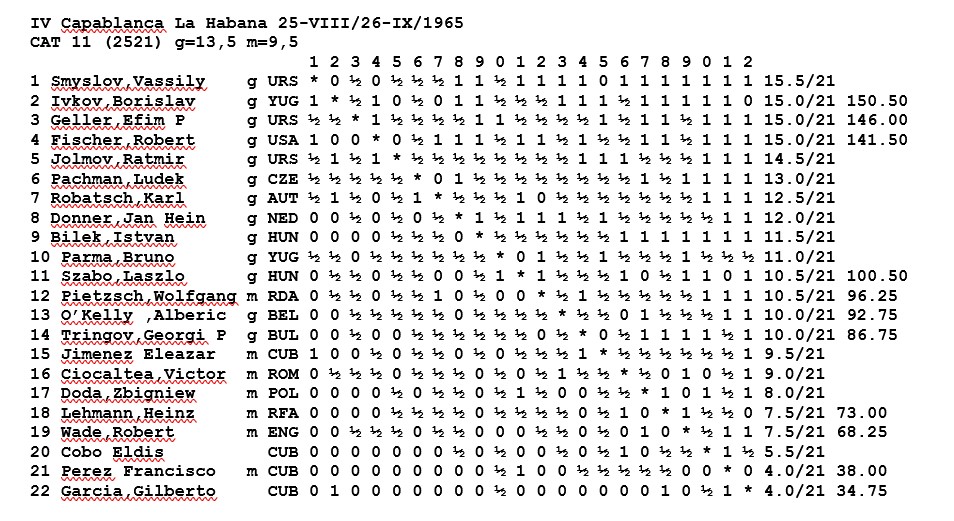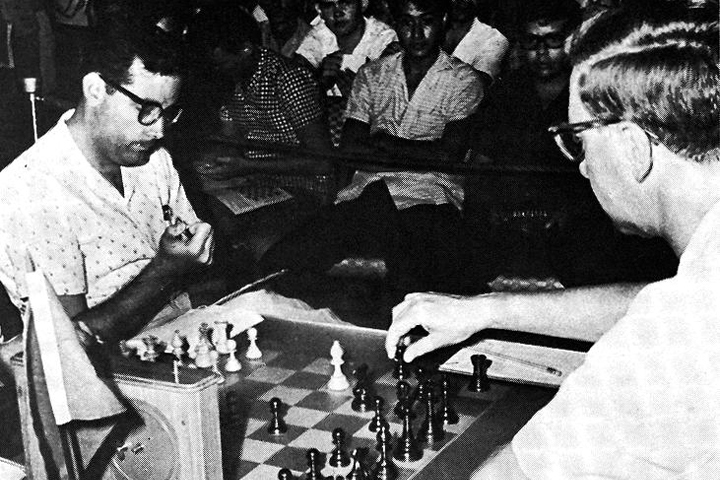


ChessBase 17 - Mega package - Edition 2024
It is the program of choice for anyone who loves the game and wants to know more about it. Start your personal success story with ChessBase and enjoy the game even more.
The notoriety that the fourth edition of the Capablanca Memorial achieved on a worldwide scale was in no way due to it being a category 1-A FIDE tournament; nor because thirteen GMs and seven IMs took part, representing fifteen countries; nor because it was the third most important tournament among those held that year. The reason — quite unusual and unprecedented — was that player number 22, to round off the list of the event, which was held in the Ambassadors’ Hall of the Habana Libre Hotel, was hundreds of miles away from the venue, specifically at the Marshall Chess Club in New York, where he played all his games by teletype.
After his impressive victory at the U.S. Championship in January 1964, when he scored 100% of the points in dispute and an astronomical performance rating of 3138, Robert James Fischer decided to “take a break”. He received several interesting offers to participate in strong tournaments, but they were all rejected. However, he showed special interest in participating in Havana 1965.
Endgames of the World Champions from Fischer to Carlsen
Let endgame expert Dr Karsten Müller show and explain the finesses of the world champions. Although they had different styles each and every one of them played the endgame exceptionally well, so take the opportunity to enjoy and learn from some of the best endgames in the history of chess.
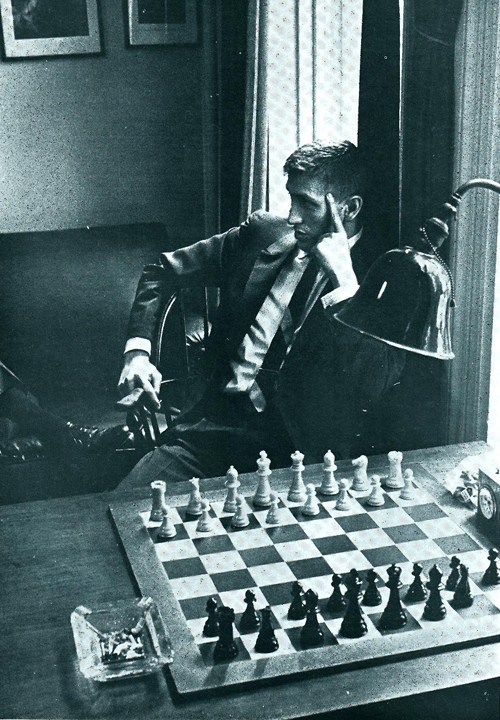
Fischer had been inactive for 18 months
Perhaps, among his main motivations to play was to pay tribute to Capablanca, since he always considered him the best player of all times. Another motivation might have been a certain nostalgic predilection for Cuba, since it was the destination of his first trip outside the national borders, in February 1956, when he was barely 13 years old. At that time, he played several games at the Club Capablanca in Havana and even gave simultaneous exhibitions.
An important feature of Fischer’s personality was his rebellious nature — this feature, beyond any doubt, was exacerbated when he learned of the decision by his country’s Department of State to deny him a visa to travel to Cuba. The solution that was proposed for the participation of the “invisible player” turned out to be memorable.
Thus, after 18 months of inactivity, Fischer returned, fully aware of the immense effort he had to make, since each of his games lasted more than nine hours on average. This handicap proved to be a very difficult obstacle to overcome, even for the genius of young Bobby.
It is true that he found tenacious resistance by players who were nominally inferior, against whom he drew once and lost three times. Nevertheless, in spite of everything, his shared second place can be considered a praiseworthy performance.
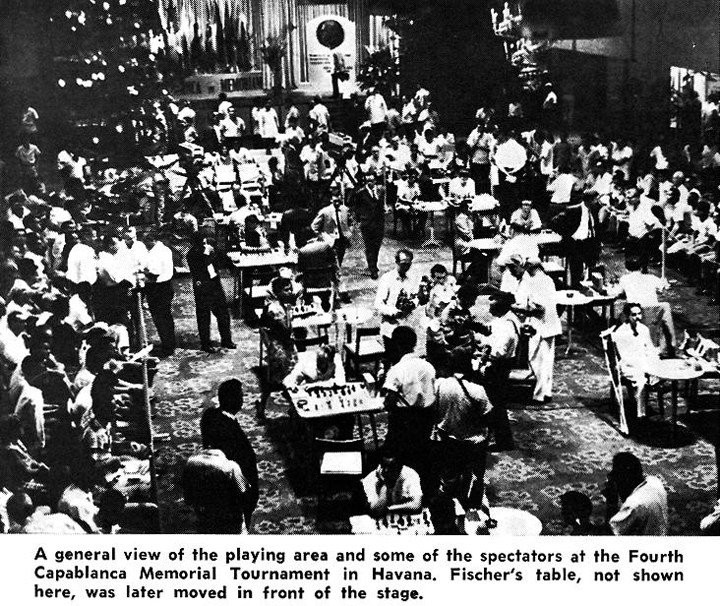
The playing hall at Hotel “Habana Libre”
Fresh from his shared victory — with GM Wolfgang Uhlmann (GDR) — two months earlier in the Yugoslav city of Zagreb (Cat. 12), GM Borislav Ivkov was the favourite, together with the Soviet trio, to win the event.
At the halfway point, the initial prediction was confirmed, as Ivkov was comfortably installed in the top spot and had managed to overcome two of his most difficult rivals (Smyslov and Fischer). Smyslov, meanwhile, had managed to secure seven victories and his first draw would come in round 10 against his compatriot Ratmir Kholmov. Efim Geller and Fischer shared 3rd and 4th places, after following very different paths. While the Soviet GM drew six times, the American drew four times but was defeated by Ivkov in the tenth round.
At the end of the 19th round, everything presaged a happy end to the tournament for Borislav, as he was one point ahead of Smyslov and Geller, and two full points ahead of Fischer, who had to endure two successive setbacks against Geller and Kholmov. However, from then on, adversity hit young Ivkov, who ended the tournament with two defeats against players who had never beaten him before. In round 20, against Cuban national master Gilberto Garcia, he made, perhaps, one of the biggest blunders of his career, when in a completely winning position he played 36...d3?? and resigned on the next move. In round 21, playing white against GM Karl Robatsch, he went for the Ruy Lopez, an opening in which he was recognized as a specialist. Nevertheless, nervousness resulting from his previous setback prevented him from developing his pieces calmly. The Austrian GM played with solvency and speed until achieving his first victory against a totally demoralised Ivkov, who saw with incredulous eyes the inexorable reality of losing his place of honour after enjoying this privilege practically from the very start of the event.
Master Class Vol.4: José Raúl Capablanca
He was a child prodigy and he is surrounded by legends. In his best times he was considered to be unbeatable and by many he was reckoned to be the greatest chess talent of all time: Jose Raul Capablanca, born 1888 in Havana.
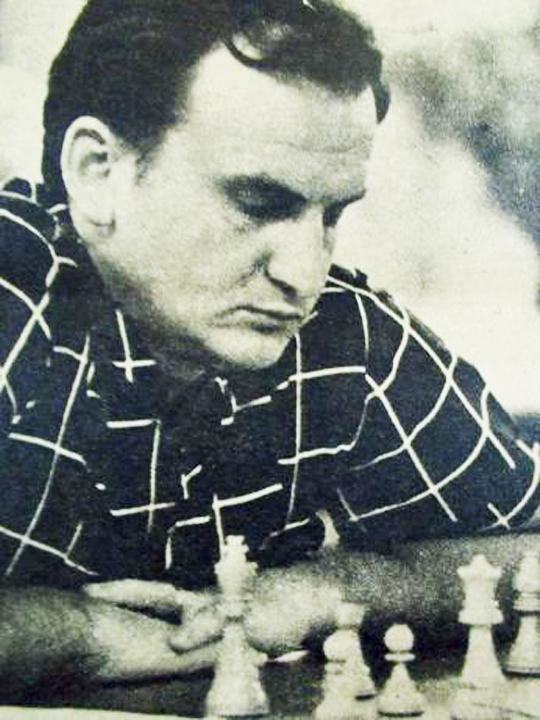
Gilberto García and Robatsch stopped Ivkov
As a consolation Ivkov obtained shared second place, the best result against grandmasters — 8 points out of 12 (+6 = 4 -2) — and the brilliancy prize, for his victory against Dutch GM Jan Heinz Donner.
After his defeat in round 19 against Cuban IM Eleazar Jimenez, Smyslov probably considered that getting near the top of the standings in the end would be a good result, especially since he had to face Geller the next day. However, with the unsolicited help of Garcia and Robatsch, he managed to win the tournament. Vasily gifted the Cuban fans marvellous performances, both for their beauty and the excellent technique shown — clear examples were his games against Donner and British IM Robert Wade.
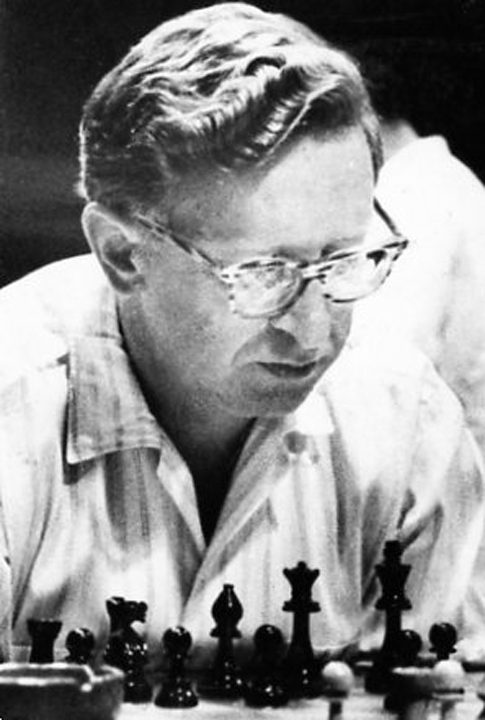
Smyslov was the winner
The tiebreak criteria for third place favoured Geller. Only he and Jolmov remained undefeated throughout the competition. His strength and mastery was put to the test in this event, and he did not achieve tournament victory mainly due to his lack of ambition to fight for the top spot. Two clear moments that support this assessment can be found in his draws with Black in rounds 19 and 21, both after 18 moves.
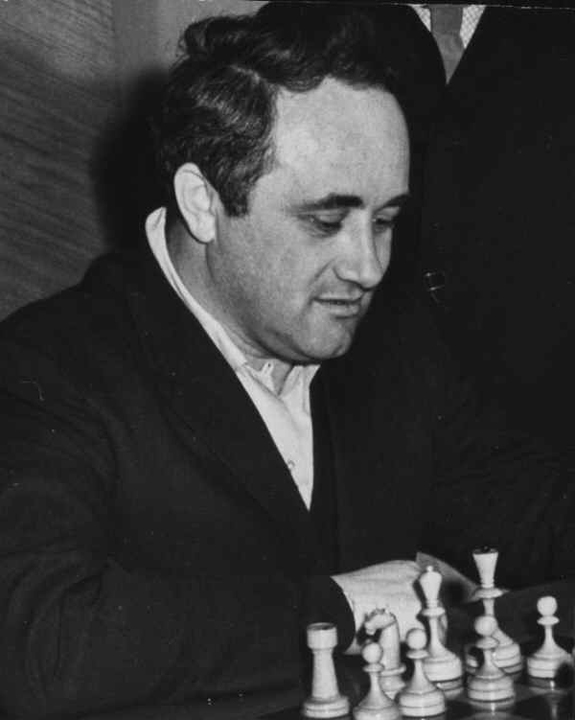
Geller finished undefeated
The 5th place was taken by Soviet GM Ratmir Kholmov. Half a point separated him from the triple tie in 2nd place and only one point from the winner. Some felt that Kholmov should have won the tournament by no less than two points and based their opinion on the great victories he obtained over Ivkov and Fischer, and the pressure he put on Geller. His 75% effectiveness against the avant-garde quartet would be his main credential to leave a very pleasant impression both to locals and foreigners. Kholmov, a good-natured individual, signed too many draws, which kept him away from taking home first prize.
A World Champion's Repertoire against the Queen's Gambit Declined
This DVD offers a complete repertoire for handling this solid opening, often featuring a dynamic approach to pose the opponent more practical problems. Both of the main continuations 3...Nf6 and 3...Be7 are covered in two separate parts.
Czech star Ludek Pachman had an acceptable performance. He only resigned against Robatsch. On this occasion he demonstrated an extremely pacifist disposition. He left us some very interesting games — the ones he played against Wade and Fischer stand out.
The attractive Jan H. Donner, with his almost two meters of height, affable character, careful demeanour and Beatlesque hairstyle, had an acceptable performance, finishing three spots above his finish in the previous edition. This time around he lost highly interesting games, but also achieved remarkable victories over Laszlo Szabo, Alberick O'Kelly and Robatsch.
Other player who improved his performance compared to the third edition of the event was the Austrian GM Robatsch. Now he managed to finish in 8th place, and notably “helped” Smyslov win the tournament by beating Ivkov. Furthermore, his beautiful victory against Pachman deserves a special mention.
The young Hungarian GM Istvan Bilek did not perform as well as might have been expected, but at least he always fought until the end. His victory over Polish IM Zbygnew Doda is highly instructive.
The 1961 World Junior Champion Bruno Parma disappointed the fans by signing 16 draws, ten of which came in the first ten rounds. He was unable to repeat his commendable performance from Zagreb 1965, but he occasionally showed glimpses of his strength, especially in his games against Fischer and Cuban IM Francisco J. Perez.
Grandmasters L. Szabo, A. O’Kelly and Georgi Tringov failed to find their best form throughout the event. The first two had a tough time due to their advanced age, while the Bulgarian, despite being a great fighter, had major difficulties finding success.
IM Eleazar Jimenez played one of the best tournaments of his life. He started slowly (2½ points out of 8), but he was able to recover. He got two remarkable results against the giants — he drew Fischer from a position of strength with black, and obtained an impeccable victory over former world champion Vasily Smyslov.
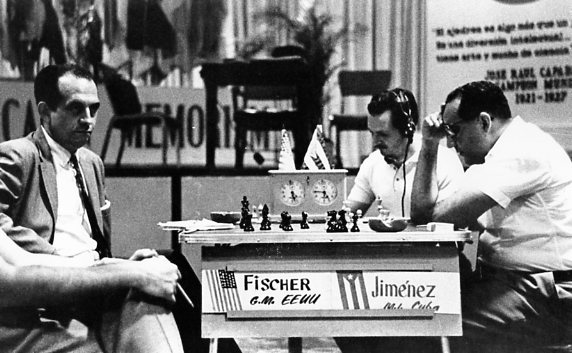
Jimenez vs Fischer — José R. Capablanca’s son was in charge of moving the black pieces
Eldis Cobo, Francisco J.Pérez and Gilberto García finished last in the standings. Cobo was very combative and showed deep ideas, but the clock was his main enemy. Perez played a large part of the event feeling sick — his one victory came against GM L. Szabo. Gilberto Garcia shared last place with Perez. Gilberto, with his peculiar all-or-nothing style shone in the end, as he achieved an incredible victory over Ivkov and radically changed the course of the tournament at the top of the standings.
The organisation of the event was excellent, as those in charge took care of all details with care and solvency. Without a doubt, never before had a chess tournament in the New Continent, and perhaps in the world, enjoyed the unconditional support of the mass media. The written press was intensely and meticulously following the action. In the same way, radio and television were very active in this regard, with many hours of broadcasting dedicated to the event.
